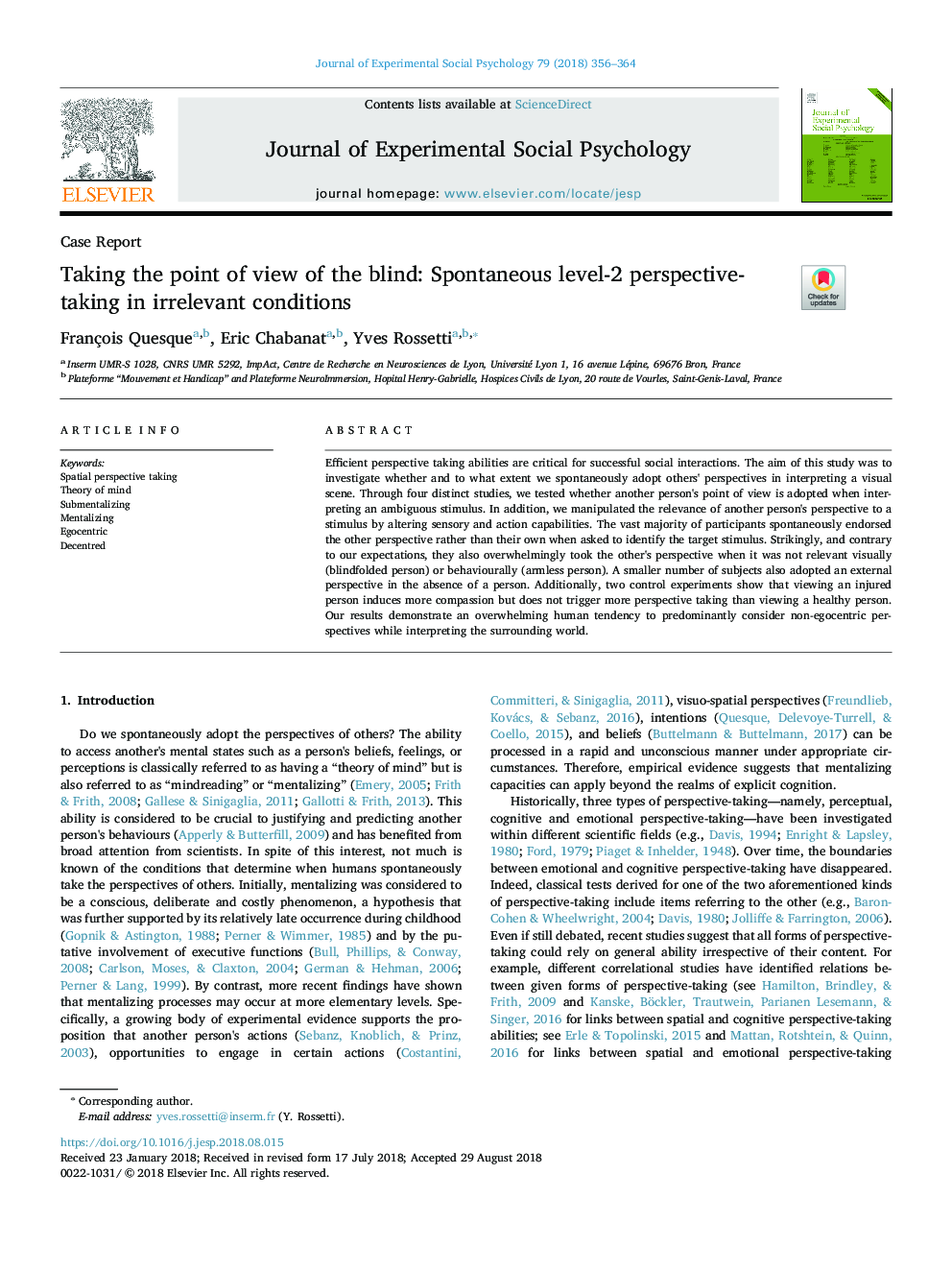| کد مقاله | کد نشریه | سال انتشار | مقاله انگلیسی | نسخه تمام متن |
|---|---|---|---|---|
| 11004725 | 1475844 | 2018 | 9 صفحه PDF | دانلود رایگان |
عنوان انگلیسی مقاله ISI
Taking the point of view of the blind: Spontaneous level-2 perspective-taking in irrelevant conditions
ترجمه فارسی عنوان
با توجه به دیدگاه کور: چشم انداز خودبخود سطح 2 در شرایط نامناسب
دانلود مقاله + سفارش ترجمه
دانلود مقاله ISI انگلیسی
رایگان برای ایرانیان
ترجمه چکیده
دیدگاه کارآیی توانایی ها برای تعاملات موفق اجتماعی بسیار مهم است. هدف از این مطالعه، بررسی اینکه آیا و به چه میزان ما به طور خودبخودی دیدگاه های دیگران را در تفسیر یک صحنه بصری پذیرفته ایم. از طریق چهار مطالعه متمایز، ما بررسی کردیم که آیا دیدگاه فرد دیگری در تفسیر یک محرک مبهم تصویب شده است یا نه. علاوه بر این، با تغییر توانایی های حسی و عمل، روابط دیگران را با یک محرک روبرو می کنیم. اکثریت قریب به اتفاق افراد به طور خودبخشی به دیدگاه دیگر نسبت به خودشان اعتماد داشتند، زمانی که خواسته شد که محرک هدف را تشخیص دهند. به طور قابل توجهی و بر خلاف انتظارات ما، آنها نیز به طور چشمگیری دیدگاه دیگر را در زمانی که آن را به صورت بصری (چشم مخاطب) و یا رفتار رفتار (شخص بی رحم) مربوط نیست. تعداد کمی از افراد نیز در غیاب یک فرد چشم انداز خارجی را پذیرفتند. علاوه بر این، دو آزمایش کنترل نشان می دهد که تماشای یک فرد مجروح موجب شفقت بیشتر می شود، اما دیدگاه بیشتری نسبت به مشاهده فرد سالم ندارد. نتایج ما نشان می دهد تمایل قلب انسانی به غالب دیدگاه های غیر انسانی در حالی که تفسیر دنیای اطراف.
موضوعات مرتبط
علوم زیستی و بیوفناوری
علم عصب شناسی
علوم اعصاب رفتاری
چکیده انگلیسی
Efficient perspective taking abilities are critical for successful social interactions. The aim of this study was to investigate whether and to what extent we spontaneously adopt others' perspectives in interpreting a visual scene. Through four distinct studies, we tested whether another person's point of view is adopted when interpreting an ambiguous stimulus. In addition, we manipulated the relevance of another person's perspective to a stimulus by altering sensory and action capabilities. The vast majority of participants spontaneously endorsed the other perspective rather than their own when asked to identify the target stimulus. Strikingly, and contrary to our expectations, they also overwhelmingly took the other's perspective when it was not relevant visually (blindfolded person) or behaviourally (armless person). A smaller number of subjects also adopted an external perspective in the absence of a person. Additionally, two control experiments show that viewing an injured person induces more compassion but does not trigger more perspective taking than viewing a healthy person. Our results demonstrate an overwhelming human tendency to predominantly consider non-egocentric perspectives while interpreting the surrounding world.
ناشر
Database: Elsevier - ScienceDirect (ساینس دایرکت)
Journal: Journal of Experimental Social Psychology - Volume 79, November 2018, Pages 356-364
Journal: Journal of Experimental Social Psychology - Volume 79, November 2018, Pages 356-364
نویسندگان
François Quesque, Eric Chabanat, Yves Rossetti,
